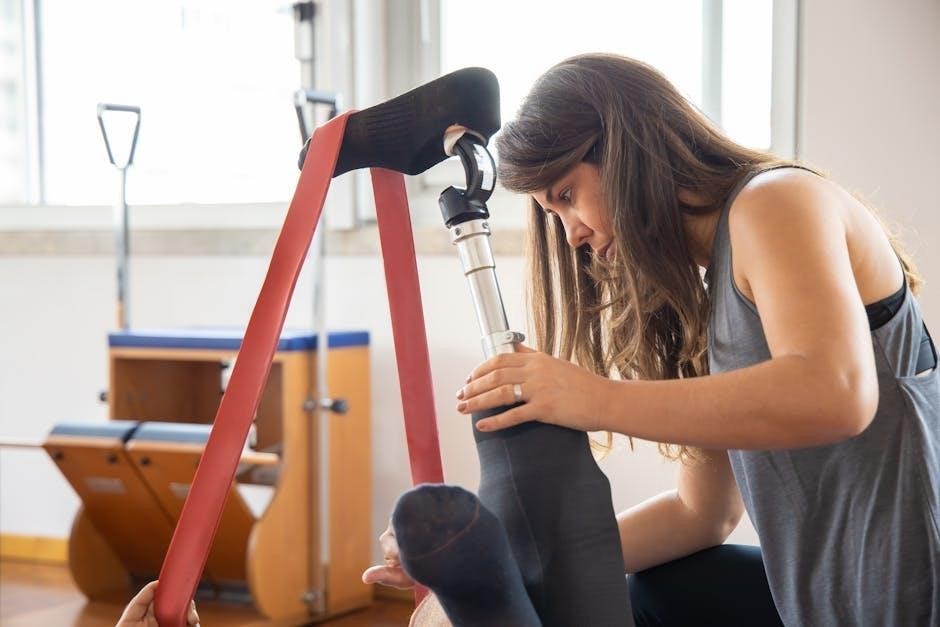
physical therapy exercises for sciatica pdf
Sciatica, a common condition characterized by pain radiating along the sciatic nerve, often stems from issues like herniated discs, degenerative disc disease, or spinal stenosis․ Physical therapy emerges as a highly effective treatment approach, focusing on alleviating pain, improving mobility, and strengthening the muscles to prevent future episodes․ A well-designed exercise program can significantly reduce discomfort and restore function, making it a cornerstone of sciatica management․
Physical therapy for sciatica typically involves a combination of stretching, strengthening, and posture improvement exercises․ These exercises target the lower back, hips, and legs to address the root causes of sciatic pain․ For instance, the knee-to-chest stretch and child’s pose are often recommended to relieve tension in the lower back and buttocks․ Additionally, the McKenzie method, which includes exercises performed in lying and standing positions, can help reduce nerve compression and improve spinal mobility․

One of the key benefits of physical therapy is its personalized approach․ A physical therapist can tailor exercises to the individual’s specific condition, ensuring safety and effectiveness․ For example, seated stretches like the glute stretch and sitting spinal stretch can be modified to suit different levels of flexibility and pain severity․ Standing stretches, such as hamstring stretches, are also effective in reducing tightness that contributes to sciatica․
Regular exercise not only helps alleviate current symptoms but also plays a crucial role in preventing future flare-ups․ By strengthening the core and improving posture, individuals can reduce the strain on their spine and sciatic nerve․ Physical therapy is often complemented by lifestyle changes, such as maintaining a healthy weight and practicing good ergonomics, to further enhance outcomes․

Understanding Sciatica and Its Symptoms

Sciatica is a common health condition characterized by pain, numbness, tingling, or weakness that radiates along the path of the sciatic nerve․ The sciatic nerve is the longest nerve in the body, extending from the lower back (lumbar region) down to the legs․ When this nerve is irritated, compressed, or inflamed, it can lead to a range of uncomfortable symptoms that affect daily activities and overall quality of life․
What Causes Sciatica?
Sciatica is not a standalone medical condition but rather a symptom of an underlying issue affecting the sciatic nerve․ The most common causes include:
- Lumbar Herniated Disc: When the soft material inside an intervertebral disc protrudes through a tear in the outer layer, it can compress the nearby sciatic nerve, leading to pain and discomfort․
- Degenerative Disc Disease: As discs age and lose their cushioning ability, they can collapse, narrowing the space around the sciatic nerve and causing irritation․
- Spondylolisthesis: A condition where one vertebra slips out of place, potentially compressing the sciatic nerve․
- Spinal Stenosis: Narrowing of the spinal canal, which can put pressure on the sciatic nerve․
- Piriformis Syndrome: Tightness or spasms in the piriformis muscle, which runs over the sciatic nerve, can cause irritation and pain․
Common Symptoms of Sciatica
The symptoms of sciatica can vary depending on the severity and location of the nerve compression․ While some people experience mild discomfort, others may suffer from debilitating pain that interferes with their ability to perform everyday tasks․ Common symptoms include:

- Pain: The most common symptom is pain that radiates along the sciatic nerve, typically starting in the lower back and extending down the back of the thigh, calf, or even the foot․
- Numbness or Tingling: Many individuals experience numbness or a “pins and needles” sensation in the affected leg or foot․
- Muscle Weakness: Weakness in the affected leg can make it difficult to stand, walk, or perform routine activities․
- Sharp Pains: Sudden, sharp pains may occur, especially when coughing, sneezing, or moving in certain ways․
- Difficulty Sitting: Sciatica often worsens when sitting for extended periods, as it increases pressure on the sciatic nerve․
How Sciatica Affects Daily Life
Sciatica can significantly impact a person’s daily life, making it challenging to perform even simple tasks․ For example:
- Walking or standing for long periods may become uncomfortable or even painful․
- Difficulty lifting objects or bending can interfere with work or household responsibilities․
- Sleeping may become problematic, as certain positions can exacerbate the pain․
- Emotional stress and frustration may arise due to the chronic nature of the condition․

Importance of Early Diagnosis
Early diagnosis and treatment are crucial to managing sciatica effectively․ If left untreated, sciatica can lead to chronic pain, permanent nerve damage, or worsening of the underlying condition․ A healthcare professional, such as a physical therapist or orthopedist, can perform a thorough evaluation to identify the root cause of the symptoms and recommend appropriate treatment options․

Understanding the symptoms of sciatica is the first step toward seeking effective relief․ By recognizing the signs and addressing the underlying causes, individuals can take proactive steps to alleviate their discomfort and regain control of their lives;
Related posts:
Archives
Calendar
| M | T | W | T | F | S | S |
|---|---|---|---|---|---|---|
| 1 | 2 | 3 | ||||
| 4 | 5 | 6 | 7 | 8 | 9 | 10 |
| 11 | 12 | 13 | 14 | 15 | 16 | 17 |
| 18 | 19 | 20 | 21 | 22 | 23 | 24 |
| 25 | 26 | 27 | 28 | 29 | 30 | 31 |
Leave a Reply
You must be logged in to post a comment.